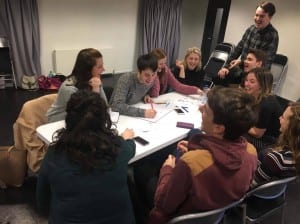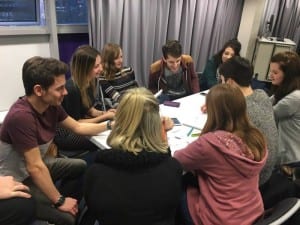We formed our theatre company back in December before we left for Christmas, so we thought we would take advantage of that by having an initial meeting in this week before our lessons started at the end of January. In this meeting we allocated roles to each member of the company. We made sure everyone had their say in what they would like to do and everyone seems happy with the roles and responsibilities they were given (see Roles and Responsibilities table on the Production Documents page).
As written in Gail Pallin’s book Stage Management: The Essential Handbook, the stage management role can be split into three sections: 1. Stage Manager, 2. Deputy Stage Manager, 3. Assistant Stage Manager. However, as each member of our company already had individual roles covering every production role, it made sense to just have one Stage Manager. Therefore, throughout this process I will be encompassing these three roles, as defined by Pallin, into my role as Stage Manager, as she states that the Stage Manager ‘has overall responsibility for the stage management team […] but should be prepared to do any and all work within the team’s remit’ (Pallin, 2010, 16).
Once roles were finalised, we then moved on to what kind of piece we wanted to make. We made mind maps and played word association to get some initial words and ideas down and then had a lengthy discussion about what the piece could be. We all agreed that with the media being dominated by politics and world-wide issues, we want to focus on the everyday man. We want to create theatre that explores ‘the reality of the fragmented, the everyday and the individual’ (Fragment Theatre Company, 2017).
Figure 1 and 2 – Pictures of Fragment Theatre Company at our first meeting (Chattaway, 2017)
By the end of the meeting we seemed to have a very rough vision surrounding the idea of escapism and the way in which people use music to escape everyday life.
In this meeting we also came up with the name for our theatre company. We all wrote down words associated with some of the themes we had come up with for performance ideas. There were many that we liked the sound of but when we researched them they were already names of other, pre-existing theatre companies. This process took a long time but after a few hours of racking our brains and constant googling, we found it. So, without further ado, may I introduce you to … Fragment Theatre Company.
In our first seminar session we were made aware of Arts Council England (ACE). This organisation ‘champion[s], develop[s] and invest[s] in artistic and cultural experiences that enrich people’s lives’ (Arts Council England, 2017). If we were creating this production outside of the university, it would be near impossible to succeed without applying for funding from the Grants for the Arts programme run by ACE. We would need to outline exactly how much money we would be applying for and provide a breakdown of what that money would be spent on (similar to our budget breakdown that will be uploaded in our Production Documents page once it has been finalised). However, as we are producing this show as part as our university degree, we have been given a budget of £166.66 from the School of Fine and Performing Arts at the University of Lincoln which we will add to by conducting fund-raising events throughout our process, photos of which will appear in our gallery as the events transpire.
Works Cited
Arts Council England (2017) About us. London: Arts Council England. Available from http://www.artscouncil.org.uk/about-us-0 [Accessed 1 February 2017].
Fragment Theatre Company (2017) About us. Lincoln: Fragment Theatre Company. Available from https://fragmenttc.blogs.lincoln.ac.uk/ [Accessed 4 March 2017].
Pallin, G. (2010) Stage management: the essential handbook, 3rd edition. London: Nick Hern Books Limited.
Figures
Figure 1 – Chattaway, A. (2017) Fragment Theatre Company at our first meeting. Lincoln.
Figure 2 – Chattaway, A. (2017) Fragment Theatre Company at our first meeting. Lincoln.

